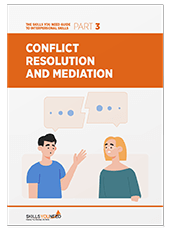Conflict Resolution and Mediation
See also: An Introduction to Conflict ResolutionConflict, or more specifically, interpersonal conflict, is a fact of life, and particularly of organisational life. It often emerges more when people are stressed, for example, when there are changes on the horizon, or when everyone is under pressure because of a looming deadline.
However, conflict can also arise in relationships and situations outside work.
Handling conflict in ways that lead to increased stress can be detrimental to your health. Poor conflict management can lead to higher production of the stress hormone cortisol, and also cause hardening of the arteries, leading to increased risk of heart attacks and high blood pressure.
Learning to deal with conflict in a positive and constructive way, without excessive stress, is therefore an important way to improve your well-being as well as your relationships.
What is Conflict?
Interpersonal conflict has been defined as:
“An expressed struggle between at least two interdependent parties who perceive incompatible goals, scarce resources, and interference from the other party in achieving their goals”.
Unpicking this a little, it means that for a disagreement to become a conflict, there needs to be:
Some element of communication: a shared understanding that there is a disagreement;
The well-being of the people involved needs to depend on each other in some way. This doesn’t mean that they have to have equal power: a manager and subordinate can be equally as interdependent as a married couple;
The people involved perceive that their goals are incompatible, meaning that they cannot both be met;
They are competing for resources; and
Each perceives the other as interfering with the achievement of their goals.
Conflict is not always a bad thing
Conflict can be destructive, leading people to develop negative feelings for each other and spend energy on conflict that could be better spent elsewhere. It can also deepen differences, and lead groups to polarise into either/or positions.
However, well-managed conflict can also be constructive, helping to ‘clear the air’, releasing emotion and stress, and resolving tension, especially if those involved use it as an opportunity to increase understanding and find a way forward together out of the conflict situation.
Our pages on conflict resolution, criticism and mediation provide advice and support for dealing with conflict and other potentially difficult situations:
There are times when it is important to be able to communicate under difficult circumstances.
While many of us would prefer to avoid difficult conversations, sometimes this is not possible. For example, a manager may have to tell someone that they are being made redundant, or a child confess to their parents that they are struggling at school.
Our page on Communication in Difficult Circumstances provides advice about how to manage these difficult conversations without creating conflict.
Before you can start to resolve any conflict, you need to be able to understand its source, and therefore the type of conflict.
Our page Introduction to Conflict Resolution explains that there are three types of conflict: personal, often about values and relationships; instrumental conflicts, about how to achieve goals; and conflicts of interest. It also introduces some ideas about strategies for resolving conflicts.
Complaints and criticism may not sound like they fit naturally with conflict resolution. But in real life, both complaints and criticism can be a source of considerable conflict, and knowing how to complain and criticise effectively, in a way that does not cause conflict, is a very useful interpersonal skill.
Our page on Constructive Criticism provides advice about how to give criticism in a way that will enable it to be heard and acted upon, and the page on Dealing with Criticism explains how to hear and accept criticism calmly, even when it is not expressed constructively. You may also find our page on Giving and Receiving Feedback useful.
Finally, our page on How to Complain (Effectively) provides some useful rules on how to make a complaint that will be heard and acted upon, the most important of which is know what you want to achieve by complaining.
Sometimes informal conflict resolution is not enough.
It is important to know when to step away from a conflict situation and ask someone more skilled to mediate. While most of us will not be called upon to mediate in an international conflict, or even an industrial relations problem, developing some mediation skills can be helpful when conflict has escalated beyond the normal level.
Our pages on Mediation Skills and Peer Mediation provide more information about this important area.
Further Reading from Skills You Need
Conflict Resolution and Mediation
Learn more about how to effectively resolve conflict and mediate personal relationships at home, at work and socially.
Our eBooks are ideal for anyone who wants to learn about or develop their interpersonal skills and are full of easy-to-follow, practical information.
Conflict is a Fact of Life
Interpersonal disagreements are a fact of life, which means that so also is interpersonal conflict.
Learning to handle difficult situations so that they become more positive, and deal well with criticism, can help to avoid some conflict. Developing your conflict resolution and mediation skills can also help to ensure that conflict becomes a positive experience, rather than negative.

